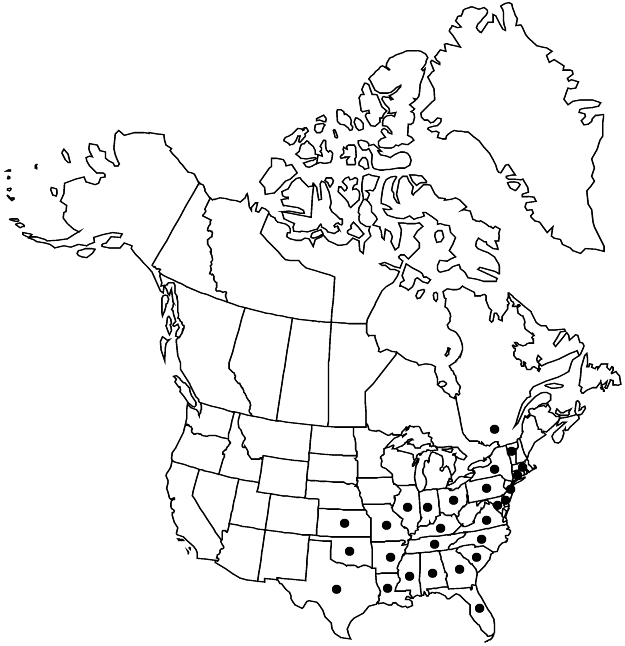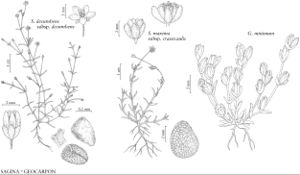Difference between revisions of "Sagina decumbens subsp. decumbens"
FNA>Volume Importer |
imported>Volume Importer |
||
| (3 intermediate revisions by 2 users not shown) | |||
| Line 1: | Line 1: | ||
{{Treatment/ID | {{Treatment/ID | ||
|accepted_name=Sagina decumbens subsp. decumbens | |accepted_name=Sagina decumbens subsp. decumbens | ||
| − | |accepted_authority= | + | |accepted_authority= |
|publications= | |publications= | ||
|common_names=Sagine décombante | |common_names=Sagine décombante | ||
| + | |special_status={{Treatment/ID/Special_status | ||
| + | |code=F | ||
| + | |label=Illustrated | ||
| + | }}{{Treatment/ID/Special_status | ||
| + | |code=E | ||
| + | |label=Endemic | ||
| + | }} | ||
|basionyms= | |basionyms= | ||
|synonyms={{Treatment/ID/Synonym | |synonyms={{Treatment/ID/Synonym | ||
|name=Sagina decumbens var. smithii | |name=Sagina decumbens var. smithii | ||
|authority=(A. Gray) S. Watson | |authority=(A. Gray) S. Watson | ||
| + | |rank=variety | ||
}} | }} | ||
|hierarchy=Caryophyllaceae;Caryophyllaceae subfam. Alsinoideae;Sagina;Sagina decumbens;Sagina decumbens subsp. decumbens | |hierarchy=Caryophyllaceae;Caryophyllaceae subfam. Alsinoideae;Sagina;Sagina decumbens;Sagina decumbens subsp. decumbens | ||
| Line 23: | Line 31: | ||
|elevation=0-500 m | |elevation=0-500 m | ||
|distribution=Que.;Ala.;Ark.;Conn.;Del.;Fla.;Ga.;Ill.;Ind.;Kans.;Ky.;La.;Md.;Mass.;Miss.;Mo.;N.J.;N.Y.;N.C.;Ohio;Okla.;Pa.;S.C.;Tenn.;Tex.;Vt.;Va. | |distribution=Que.;Ala.;Ark.;Conn.;Del.;Fla.;Ga.;Ill.;Ind.;Kans.;Ky.;La.;Md.;Mass.;Miss.;Mo.;N.J.;N.Y.;N.C.;Ohio;Okla.;Pa.;S.C.;Tenn.;Tex.;Vt.;Va. | ||
| − | |discussion=<p>Specimens of < | + | |discussion=<p>Specimens of <i></i>subsp.<i> decumbens</i> from Alberta, New Brunswick, Saskatchewan, and Arizona represent historical collections that apparently did not persist.</p><!-- |
| − | --><p>Subspecies decumbens is extremely variable. A slender, nearly apetalous variation with a greater frequency of 4-merous flowers has previously been recognized as < | + | --><p>Subspecies decumbens is extremely variable. A slender, nearly apetalous variation with a greater frequency of 4-merous flowers has previously been recognized as <i></i>var.<i> smithii</i>; the range of variability is continuous and it seems best to consider the material as a single taxon.</p> |
|tables= | |tables= | ||
|references= | |references= | ||
| Line 33: | Line 41: | ||
-->{{#Taxon: | -->{{#Taxon: | ||
name=Sagina decumbens subsp. decumbens | name=Sagina decumbens subsp. decumbens | ||
| − | + | |authority= | |
| − | |authority= | ||
|rank=subspecies | |rank=subspecies | ||
|parent rank=species | |parent rank=species | ||
| Line 47: | Line 54: | ||
|publication title= | |publication title= | ||
|publication year= | |publication year= | ||
| − | |special status= | + | |special status=Illustrated;Endemic |
| − | |source xml=https:// | + | |source xml=https://bitbucket.org/aafc-mbb/fna-data-curation/src/2e0870ddd59836b60bcf96646a41e87ea5a5943a/coarse_grained_fna_xml/V5/V5_297.xml |
|subfamily=Caryophyllaceae subfam. Alsinoideae | |subfamily=Caryophyllaceae subfam. Alsinoideae | ||
|genus=Sagina | |genus=Sagina | ||
Latest revision as of 22:10, 5 November 2020
Leaves: basal rosette forming in winter annual plants, absent later. Sepals ovate, hyaline margins or apex frequently purple. Seeds light tan, with delicate reticulate ridge pattern (50–80×), smooth or pebbled to strongly tuberculate. 2n = 36.
Phenology: Flowering spring–early summer.
Habitat: Moist or dryish sandy places, field margins, open pine woods, paths, roadsides, sidewalk cracks, lawns
Elevation: 0-500 m
Distribution

Que., Ala., Ark., Conn., Del., Fla., Ga., Ill., Ind., Kans., Ky., La., Md., Mass., Miss., Mo., N.J., N.Y., N.C., Ohio, Okla., Pa., S.C., Tenn., Tex., Vt., Va.
Discussion
Specimens of subsp. decumbens from Alberta, New Brunswick, Saskatchewan, and Arizona represent historical collections that apparently did not persist.
Subspecies decumbens is extremely variable. A slender, nearly apetalous variation with a greater frequency of 4-merous flowers has previously been recognized as var. smithii; the range of variability is continuous and it seems best to consider the material as a single taxon.
Selected References
None.
